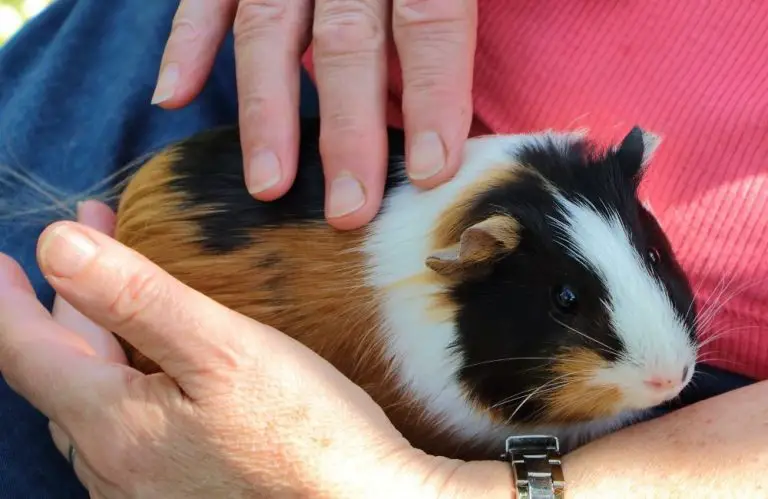Can Guinea Pigs Eat Plums?
Plums are deliciously sweet and healthy fruits with a large variety from sweet to tart types. Plums can be red, purple, yellow, or green in colour as they have up to 40 different species.
Plums come from the Plumus genus where they are closely related to apricots and peaches. Their flesh is edible apart from their pit.
With some foods and fruits being unsafe for guinea pigs you may wonder where plums lie in their food curve. Are they unsafe or safe?
Can you share this juicy fruit with them? We’re just about to find out. Keep reading.
Can guinea pigs eat plums?
Guinea pigs can eat plums as they are a healthy, safe, and nutritious treat for them to have. Plums contain essential vitamins like Vitamin C, Vitamin K, Vitamin A, and Vitamin E. They aid in boosting immunity, enhancing their eyesight, fast healing of wounds, and bettering blood clotting.
Plums also have antioxidants and flavonoids that work in preventing diseases like cancer and reducing inflammations. The fruits are great for guinea pigs but should be fed in small amounts as they are high in calcium, phosphorus, and are acidic.
Health benefits of feeding plums to guinea pigs
Plums have many health benefits for your pet making them a great addition to their diet. They contain nutrients like:
Vitamin C
Guinea pigs lack the ability to produce Vitamin C just like humans. This makes it vital to feed them foods containing a good amount of it to prevent its deficiency.
A deficiency of Vitamin C in guinea pigs is dangerous to their health. Lack of Vitamin C leads to scurvy which apart from being quite common in guinea pigs is a major cause of their death.
Scurvy is painful and it affects their bones, joints, and skin. They begin being lethargic, having diarrhoea and a rough coat.
You should always ensure that you are feeding them foods rich in the vitamin. Vitamin C will also help in fastening the healing of wounds and aid in the absorption of iron in the body.
Vitamin A
Vitamin A in plums will enhance your pet’s eyesight considering they naturally have poor eyesight. Apart from bettering their eyesight, Vitamin A enhances growth in guinea pigs.
Vitamin K
Vitamin K contains the component prothrombin that works in facilitating blood clotting in case of injuries.
Vitamin E
Vitamin E is an important nutrient that functions in reducing the risk of heart disease and cancer. It also reduces inflammations and enhances the skin’s condition.
Potassium
Potassium is a mineral that will help your guinea piggy by enhancing their heart health and lowering blood pressure. It does this by balancing out the electrolytes and water content in their bodies.
Antioxidants
Plums are rich in antioxidants found mostly in their skin which is edible too. The antioxidants reduce the risk of diseases and heart problems.
Flavonoids
Flavonoids work in reducing inflammations in the body.
Negative effects of feeding plums to guinea pigs
Plums are healthy but they will also have negative side effects when fed in large quantities. This is because they contain the following:
Calcium
Calcium is an important mineral for guinea pigs as it helps in the formation of strong bones during growth. The calcium though is only required by the young ones who are still growing.
Mature guinea pigs do not need it and when in high amounts it’s harmful to them. High amounts of calcium lead to bladder and kidney stones.
These stones are very painful in adult humans making their pain even worse for guinea pigs who are smaller in size. Bladder and kidney stones bring about urination problems in your pet.
It becomes painful for them to urinate and they may even cry out. Their urine may contain blood and sometimes they may not even be able to urinate at all.
Phosphorus
Phosphorus in large amounts makes guinea pigs have slow stunted growth. It will also reduce their lifespan making them live a shorter life than they normally would.
Acidic content
Plums contain acid and it’s more if they are not well ripened. Acid leads to bloating and stomach upsets in your pet.
Do guinea pigs like plums?
Most guinea pigs like plums because they are sweet and they make for great treats. If your guinea pig doesn’t like them though, you can feed them healthy alternatives like strawberries, cherries, and apples that are sweet and nutritious for them.
How to feed plums to guinea pigs
Pick the ripe juicy fruits and wash them thoroughly to get rid of pesticides and chemical residue that could be on their skin.
The skin and fleshy juicy inner parts are edible apart from the hard pit.
Cut up one plum and remove the pit which is inedible. Not only is the pit a choking hazard but also toxic as it contains amygdalin.
Amygdalin is a substance that produces cyanide when broken down and it’s poisonous to humans and pets with guinea pigs included.
All leaves and branches should be removed as they too contain traces of cyanide.
Guinea pigs should only eat one plum two times a week to avoid any harmful effects brought by overfeeding them.
Only the fresh fruit should be given as jams and prunes which are dried plums are high in sugar which can cause stomach upsets and diarrhoea in them.
Conclusion
Plums are great treats for guinea pigs. They can eat one plum twice a week as they are healthy and nutritious fruits.
Plums contain essential Vitamins C which prevents the common condition scurvy. They also have other vitamins, antioxidants, flavonoids, and potassium.
These nutrients help in boosting their immunity, enhancing their eyesight, reducing inflammations, preventing diseases, and bettering their blood clotting capabilities.
Plums, like other fruits, should be fed in moderation as they contain calcium, phosphorus, and acid that bring about urination problems, shorter lifespans, stomach upsets, and diarrhoea when in high quantities.
The pits, leaves, and branches should never be fed as they contain cyanide which is poisonous.

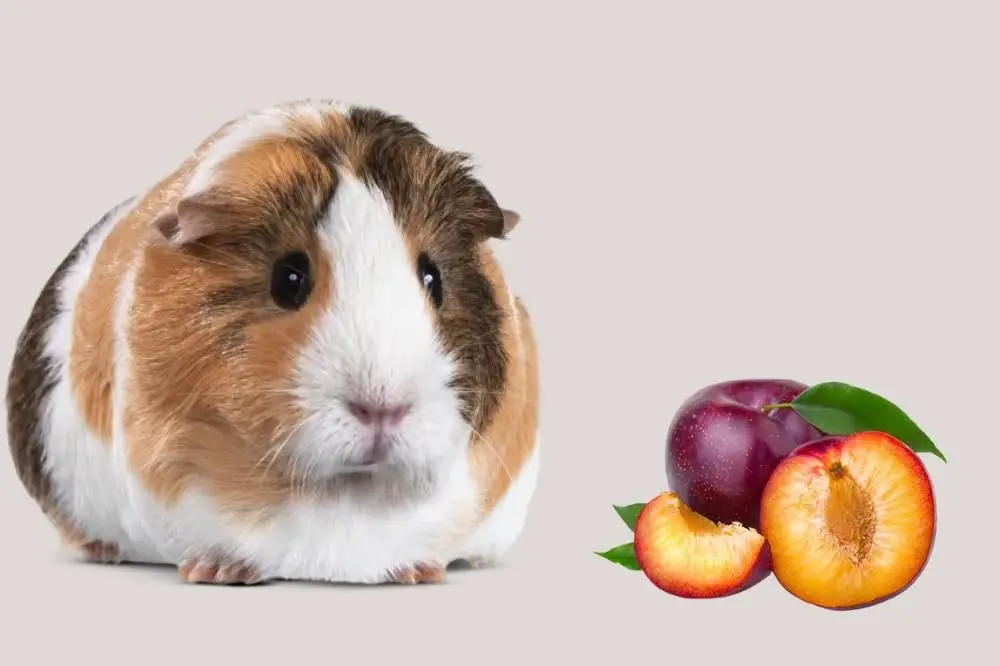
![Can Guinea Pigs Eat Lettuce? [Feeding Guide!]](https://atractivopets.com/wp-content/uploads/2021/01/Eating-Lettuce-768x511.jpg)
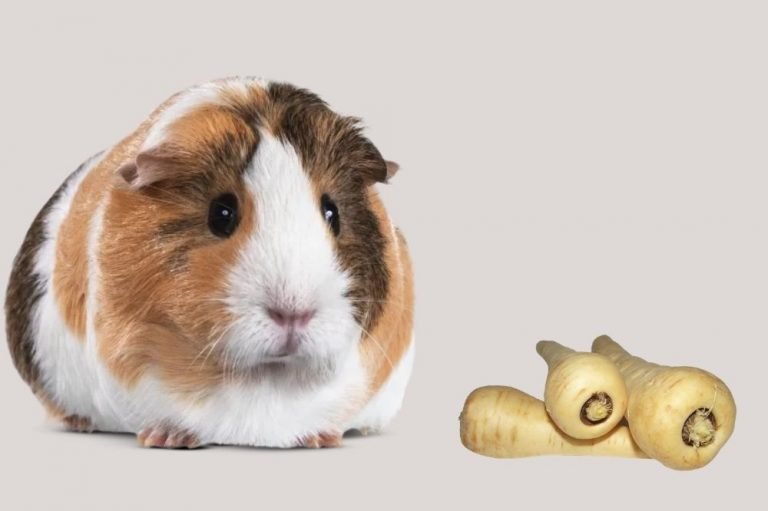
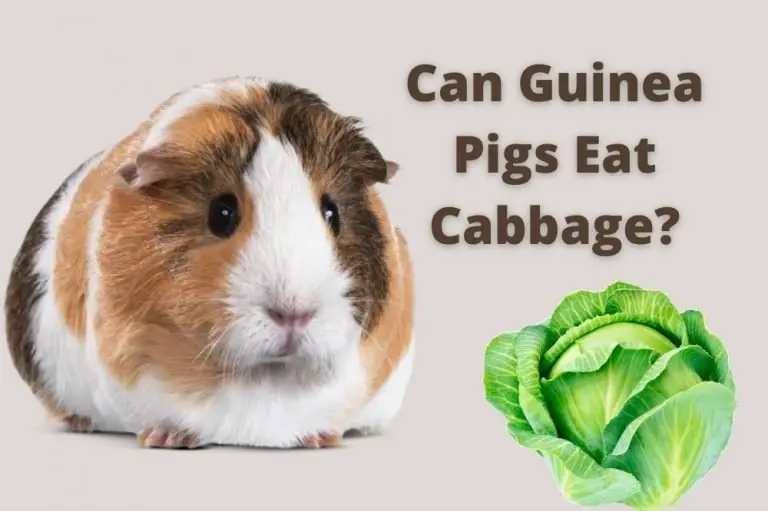
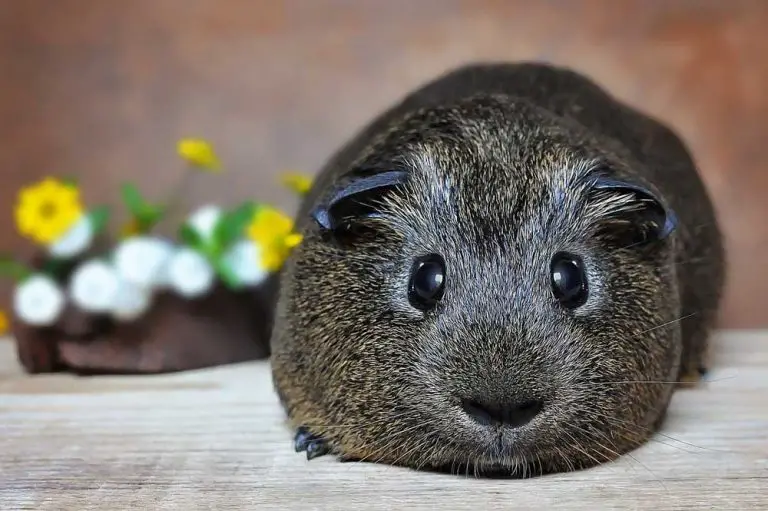
![Can Guinea Pigs Eat Corn? [Feeding Guide!]](https://atractivopets.com/wp-content/uploads/2020/12/Can-Guinea-Pigs-Eat-Corn-768x511.jpg)
